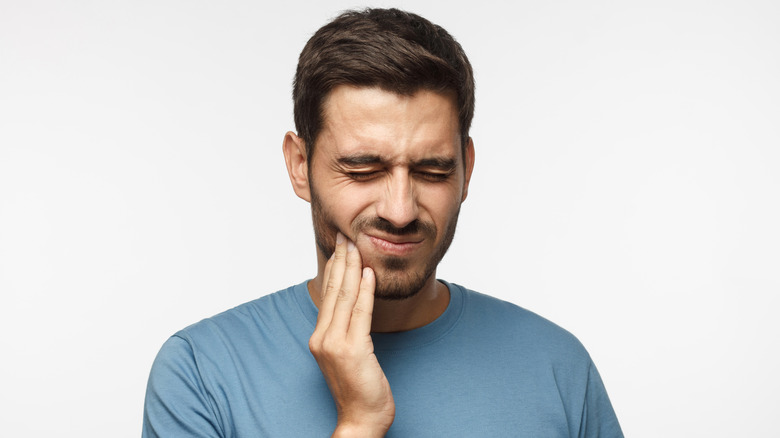What Does It Mean When The Right Side Of Your Face Hurts

Pheelings media/Shutterstock
By Sam Ramsden/Sept. 7, 2021 5:41 pm EDT
Experiencing pain in any capacity can be an extremely daunting experience, especially when it’s confined to one area of the body such as the face. But, what does it mean if the right side of your face hurts?
According to Healthline, most causes of facial pain are generally nothing to be too concerned about and any discomfort is usually the result of a slight injury or headache. Other common causes of facial pain can also be attributed to oral infections, ulcers, open soars, abscesses, and toothache.
However, pain on one side of the face can be brought on by a variety of different causes and feel quite different. According to Buoy Health, common characteristics of one-sided facial pain include burning or aching sensations, sharp or dull pain, electric and sock-like sensations, and can be both constant or intermittent. Some potential causes of one-sided facial pain, including on the right side, can be brought on by infections, neurologic causes, structural causes such as musculoskeletal issues, injuries, dental pain, and more.
Here's when you should see a doctor for your facial pain

Per Healthline, pain in your face could also be a symptom of a much more serious problem, including herpes zoster, shingles, severe migraines, a sinus infection, a nerve disorder, and herpes simplex virus 1 which can lead to cold sores.
Although facial pain generally isn’t an emergency, it is advised that you contact a doctor if you’re experiencing unexplainable, unbearable, or continuous pain in your face in order to figure out the root cause of the discomfort. If your facial pain is sudden and feels as if it is radiating from the chest or the left arm, it’s also strongly advised you call the emergency services immediately as these symptoms could indicate the early stages of a heart attack.
According to Medical News Today, less serious facial pain can be treated at home with a range of effective methods of self-care, including applying ice to the affected area several times a day, keeping your head elevated to help mucus and fluid drainage from the face, taking medication such as ibuprofen, naproxen, or acetaminophen, and gargling with salt water three times each day.
Source: Read Full Article
